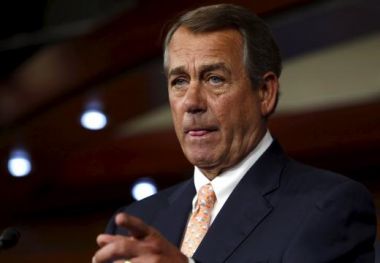Speaker Boehner vows to do 'everything possible' to stop 'bad' nuke deal with Iran

US House Speaker John Boehner has vowed to lead lawmakers in doing "everything possible to stop" the "bad deal" the Obama administration struck with Iran concerning the latter's nuclear programme.
"Here in the House, the people's priorities continue to be our priorities," Boehner said in a press conference on Wednesday, according to an emailed statement from his office.
The United Nations Security Council had endorsed and approved the deal on Monday by adopting a resolution that will establish monitoring of Iran's nuclear program and considering the "eventual removal" of all nuclear-related sanctions against the country.
In an agreement reached in Vienna last July 14, Iran reaffirmed "that it will under no circumstances ever seek, develop or acquire any nuclear weapons," according to the UN.
UN Secretary General Ban Ki-moon said "the resolution provides for the eventual removal of all nuclear-related sanctions against Iran and guarantees that the International Atomic Energy Agency (IAEA) will continue to verify Iran's compliance with its nuclear-related commitments under the JCPOA."
However, the assurance from the UN has failed to satisfy Boehner and other lawmakers opposed to the deal.
"While the president's Iran deal may have been applauded at the United Nations, I think he faces serious scepticism here at home," he said. "Let me just assure you that Members of Congress will ask much tougher questions this afternoon when we meet with the president's team. Because a bad deal threatens the security of the American people—and we're going to do everything possible to stop it."
President Obama is touting the deal as something that "will make America and the world safer and more secure."
"This week, the United States and our international partners finally achieved something that decades of animosity has not – a deal that will prevent Iran from obtaining a nuclear weapon," he said in his weekly address on July 18.
Critics said the deal will allow Iran to obtain a nuclear weapon.
Obama flatly denied this, saying the "deal actually closes off Iran's pathway to a nuclear weapon."
"Now, if you think it sounds strange that the United States, Great Britain, France, Germany, Russia, China, and some of the world's best nuclear scientists would agree to something like that, you're right [that it's a bad deal]," he said.
According to the White House, Iran today has a stockpile of enriched uranium and nearly 20,000 centrifuges, that are enough to create eight to 10 bombs.
Without the deal, Iran could build its first nuclear weapon in two to three months.
"With this deal, they'll have to ship 98 percent of that material [uranium] out of the country – leaving them with a fraction of what it takes to make even one weapon," Obama said. "With this deal, they'll have to repurpose two key nuclear facilities so they can't produce materials that could be used for a nuclear weapon."
Obama also belied critics' claim that Iran could just ignore the deal and cheat, saying that Iran's key nuclear facilities will be monitored 24/7.
"With this deal, international inspectors will have access to Iran's entire nuclear supply chain," he said.
He said if Iran violates the deal, sanctions that aim to cripple its economy would be reimposed.
"Does this deal resolve all of the threats Iran poses to its neighbours and the world? No. Does it do more than anyone has done before to make sure Iran does not obtain a nuclear weapon? Yes," he said.











